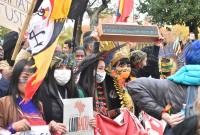Support strong Canadian climate journalism for 2025
It is bizarre to hear the horrified reactions of climate activists to the fact that COP host the United Arab Emirates (UAE), chaired by the state oil company CEO, is not “all-in” on climate action.
Rather than supporting a phaseout of oil, shock of all shocks, the UAE might even be using COP28 to look for opportunities to develop and sell more oil. As the world’s seventh-largest oil producer, with 300 years of supply, and two-thirds of their oil exported — making them one of the richest petrostates on the planet — why would anyone expect anything different?
It is hard to know if the reaction from climate activists is feigned disbelief or genuine naivete. Either way, it makes me wonder why climate activists are legitimizing the COP28 fiasco by showing up at all. Surely a more effective tactic would be to boycott COP28 altogether and shed some light on the hypocrisy of the moment. How on Earth do climate campaigners and youth activists justify travelling to the UAE other than responding to FOMO or FOMAP (Fear of Missing a Party).
I was so disturbed by the absurd juxtaposition of this COP, at this time in history, that I reached out to Greta Thunberg in the summer to see if she would consider a global youth activist boycott of COP and instead organize domestic protests to bring the issue of urgency and hypocrisy home for people. The response I received was that she only speaks to international media outlets, i.e., not climate change experts. No doubt the stark reality of climate activist stardom.
I suppose my disappointment at the lack of a response should not be surprising in the highly politicized climate space at COP where the “blah, blah, blahs” are battling it out with the “rah, rah, rahs.”
I support the idea of countries getting together to hammer out the details of how to address climate change and the global inequity it has exacerbated. There are probably a few hundred people critical to that task. Maybe a thousand, to be generous.
What I question is the now bloated entourage of 97,000 government reps, politicians (past and present), oil companies and NGOs that descend on any spot in the world, whether in air-conditioned tents in the desert or “oil central” in the Middle East.
It is frankly an embarrassing spectacle. The vast majority of attendees are not part of the negotiations or even allowed near the negotiation space. They are no more than climate groupies hoping for a glimpse of the action. Furthermore, the heavy lifting for COP meetings happens well before the main event in the hundreds of preparatory meetings.
Why then are there 3,500 Brazilians at COP28? And how is it possible that Canada sends as many people as the United States, a country 10 times the size? The Saskatchewan delegation alone has 55 representatives (note their population is one-third the size of Toronto), with a cost to the Saskatchewan taxpayers of $765,000.
The COP process itself has been flawed from the start. It’s a negotiation among politicians, not experts. And that goes a long way to explain why we are having such difficulty meeting our targets. If you take a look at Canada’s delegation, you will not see any mention of climate policy or energy transition experts joining Canada’s climate delegation, instead a large youth contingent is going.
I appreciate that there are no doubt wonderful opportunities to engage young people in the process. Yet, I cannot help but think this is more about performative politics than sound climate policy. And the youth activists themselves have been duped into playing their part in the show — co-opted, as it were.
It's time for the COP process to get real. And time for Canada to focus on emission reductions, not the ridiculous and overstated refrain of Canadians telling the world we need more ambition.
We have one of the worst greenhouse gas emission profiles of any country in the world. Moreover, we are not on track to meet our 2030 emission targets and the world is unlikely to meet the 2 C climate threshold needed to prevent the very worst of climate catastrophes.
How about people stay home and work on real climate solutions versus flying around the globe making sure they are seen.
Bruce Lourie is president of the Ivey Foundation and co-author with Rick Smith of Slow Death by Rubber Duck: How the Toxic Chemistry of Everyday Life Affects Our Health.






Comments
The entire COP event is a greenwashing joke and should be discontinued. Why would they even allow oil execs to participate given their only interest is to greenwash and continue to increase production and discourage green energy initiatives.
We are governed by lunatics.
I submitted a comment on this story earlier that reiterated how a policy to bring heat pumps to every home and business would likely make a much more effective national climate policy than sending delegates to a big party run by oil oligarchs, with separate funding to assist the global south adapt.
That comment ended up in the "moderators queue" something I've never seen before on this site.
Did that comment get deleted for unknown reasons or is it still up in the ether?
From personal experience, Alex. oftentimes, going to the queue is a result of one or more of the following:
1. the post is too long (though max length remains unspecified); solved by breaking it into smaller pieces.
2. It contains a link of some (I can't yet characterize it) disallowed origin; unknown solution aside from giving a specific, copy-and-pasted bit of text from the referenced doc or page, and then suggesting people google that text to find the reference.
3. Maybe something else, but it's usually one or both of the aforementioned.
I have never had a follow-up from CNO when a post has "gone to the queue".